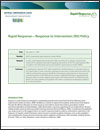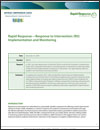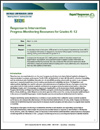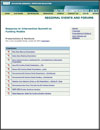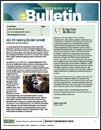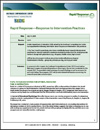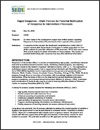SEDL's Free A-Z List of Free Resources for Response to Intervention (RtI)
Response to Intervention (RtI)
All Products in this Category
Products are listed by date published.
Rapid Response: Response to Intervention (RtI) Policy (2009)
In 2007, a state department of education served by the Southeast Comprehensive Center (SECC) requested information regarding state policies on RtI. SECC staff consulted the scholarly literature on education policy in the United States in order to provide a backdrop for discussion of state policies focused on RtI. Staff also reviewed the resources identified in a previous rapid response and conducted searches of state Web sites for revised or additional information regarding formal RtI policy.
In 2007, a state department of education served by the Southeast Comprehensive Center (SECC) requested information regarding state policies on RtI. SECC staff consulted the scholarly literature on education policy in the United States in order to provide a backdrop for discussion of state policies focused on RtI. Staff also reviewed the resources identified in a previous rapid response and conducted searches of state Web sites for revised or additional information regarding formal RtI policy.
Rapid Response: Response to Intervention Implementation and Monitoring (2009)
In 2007, two state departments of education served by the Southeast Comprehensive Center requested information on monitoring tools or instruments to assess the quality of district/school implementation of response to intervention. This rapid response offers an update to the information previously provided.
In 2007, two state departments of education served by the Southeast Comprehensive Center requested information on monitoring tools or instruments to assess the quality of district/school implementation of response to intervention. This rapid response offers an update to the information previously provided.
Rapid Response: Response to Intervention Progress Monitoring Resources for Grades K–12 (2009)
SEDL's Southeast Comprehensive Center developed this resource in response to a request from a state department of education for information on response to intervention progress monitoring resources for K–12 reading, writing, and mathematics.
SEDL's Southeast Comprehensive Center developed this resource in response to a request from a state department of education for information on response to intervention progress monitoring resources for K–12 reading, writing, and mathematics.
Response to Intervention (RtI) 2009 Regional Summit on Funding Models (2009)
The objectives of the Response to Intervention Summit on Funding Models were to increase knowledge of funding models for RtI implementation, to develop strategies and action steps for addressing RtI funding, and to increase networking opportunities for improved implementation of funding models
The objectives of the Response to Intervention Summit on Funding Models were to increase knowledge of funding models for RtI implementation, to develop strategies and action steps for addressing RtI funding, and to increase networking opportunities for improved implementation of funding models
SEDL Letter Volume XXI, Number 1: Improving School Performance (2009)
School improvement isn’t just about schools. It’s also about students and teachers, and how education leaders at all levels—state, district, school, and classroom—work together to help students succeed. This issue of SEDL Letter explores school improvement in a variety of areas.
School improvement isn’t just about schools. It’s also about students and teachers, and how education leaders at all levels—state, district, school, and classroom—work together to help students succeed. This issue of SEDL Letter explores school improvement in a variety of areas.
Southeast Comprehensive Center eBulletin, Volume 3, Number 4: SECC RtI Funding (2009)
In February, 2009, SECC convened key leaders from SEAs in six southeastern states to discuss various approaches to funding Response to Intervention (RtI) during a summit held in Atlanta, GA. Participants attended an interactive session by representatives of various offices in the U.S. Department of Education (Title I, Title III, and the Office of Special Education Programs) to gain insight into fiscal policies that support the implementation of RtI and what is allowable under specific provisions of federal law. Based on information from SECC's evaluation and debriefing session on the summit, this edition of the SECC eBulletin discusses important lessons that were learned.
In February, 2009, SECC convened key leaders from SEAs in six southeastern states to discuss various approaches to funding Response to Intervention (RtI) during a summit held in Atlanta, GA. Participants attended an interactive session by representatives of various offices in the U.S. Department of Education (Title I, Title III, and the Office of Special Education Programs) to gain insight into fiscal policies that support the implementation of RtI and what is allowable under specific provisions of federal law. Based on information from SECC's evaluation and debriefing session on the summit, this edition of the SECC eBulletin discusses important lessons that were learned.
Rapid Response: Response to Intervention Practices (2008)
SEDL's Southeast Comprehensive Center developed this resource in response to a request from a state department of education for the following information about Response to Intervention practices: For Tiers II and III, what does the research indicate about pupil/teacher ratios for optimal or maximum small group instruction? Do small group size numbers change with grade levels? What does the research indicate about intervention effectiveness beyond implementation fidelity—group size, minutes per day, and days per week?
SEDL's Southeast Comprehensive Center developed this resource in response to a request from a state department of education for the following information about Response to Intervention practices: For Tiers II and III, what does the research indicate about pupil/teacher ratios for optimal or maximum small group instruction? Do small group size numbers change with grade levels? What does the research indicate about intervention effectiveness beyond implementation fidelity—group size, minutes per day, and days per week?
Rapid Response: State Policies for Parental Notification of Response to Intervention Processes (2008)
SEDL's Southeast Comprehensive Center (SECC) developed this resource in response to a request: "Do other states in the southeastern region have written policies regarding Response to Intervention and how do those states inform parents of the process?" In response, the SECC queried several state departments of education to obtain the requested information.
SEDL's Southeast Comprehensive Center (SECC) developed this resource in response to a request: "Do other states in the southeastern region have written policies regarding Response to Intervention and how do those states inform parents of the process?" In response, the SECC queried several state departments of education to obtain the requested information.

